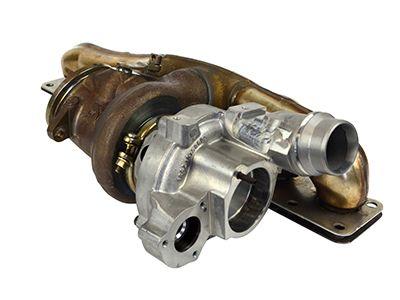A BMW equipped with the N55 engine is known for its strong mid-range power, smooth delivery, and impressive tuning potential, but like any turbocharged platform, consistent performance depends on the health of its turbo system. Over time, high mileage, aggressive driving, or extended periods of heat exposure can slowly deteriorate turbo components, causing owners to experience reduced boost, slower acceleration, and less reliability than they once enjoyed. This is why understanding the importance of an N55 turbo rebuild becomes essential, especially for drivers looking to maintain high performance without compromising engine longevity. Whether your goal is restoring factory power or preparing the car for higher boost levels, taking the time to assess and rebuild your N55 turbocharger can offer significant advantages. As this guide unfolds, you’ll gain deep insights into symptoms, processes, benefits, maintenance practices, and performance expectations that can help you make smart decisions about your BMW’s forced-induction system. With brands like PalenonPerformance offering high-quality performance solutions, BMW owners now have access to reliable resources that support long-term turbocharger health and efficiency.
Understanding the Function of the N55 Turbocharger
Why the Turbo Matters for Power and Response
The N55 turbocharger is at the core of what makes BMW’s modern inline-six engines so engaging, as it’s responsible for delivering immediate torque, rapid spool, and strong acceleration across the rev range. This single twin-scroll turbo design efficiently channels exhaust gases to improve airflow and reduce lag, giving the N55 its signature responsiveness and driveability. When issues arise, however, the engine struggles to maintain this optimal performance because the turbo no longer compresses air effectively, resulting in slow spool times, misfires, and reduced horsepower. An N55 turbo rebuild becomes essential when owners begin noticing these performance drops, as rebuilding helps restore the internal components to factory-fresh condition. Drivers often overlook minor symptoms, such as slight whistle noises or increased oil consumption, which can eventually snowball into major issues if ignored. Brands like Palenonperformance frequently highlight that preventative maintenance and early intervention can significantly extend the turbo’s lifespan, ensuring that your BMW continues delivering the adrenaline-filled performance it’s known for.
Signs Your BMW Needs an N55 Turbo Rebuild
Common Warning Symptoms and What They Mean
Recognizing early signs that your engine may need an N55 turbo rebuild can prevent catastrophic failure and help you avoid high repair costs down the line. The most common symptoms include excessive smoke from the exhaust, which often indicates worn seals or leaking oil inside the turbo housing. Another frequent issue is a noticeable reduction in boost pressure, causing the car to feel sluggish or unable to achieve its usual acceleration, which is typically due to damaged turbine wheels or inefficient airflow. You might also hear unusual sounds such as whining, grinding, or metallic scraping, all of which suggest internal bearing wear that requires immediate attention. Some BMW owners report that the check engine light appears, often accompanied by codes related to boost pressure or air-fuel imbalances, signaling deeper turbo inefficiencies. By acting quickly when these warning signs appear, you can prevent further damage to the engine and avoid the high costs of replacement, making a rebuild a smarter and more budget-friendly solution.
The Complete N55 Turbo Rebuild Process
What Happens During a Professional Turbo Rebuild
A full N55 turbo rebuild involves a series of detailed steps designed to restore the unit to like-new condition by addressing worn components and improving structural integrity. The process begins with a complete teardown of the turbocharger, where technicians carefully inspect all internal parts, including bearings, seals, turbine blades, and compressor wheels for wear or damage. Once the inspection identifies faulty elements, these components are replaced with upgraded or OEM-equivalent parts that enhance performance and reliability. The turbo housing is cleaned thoroughly to remove carbon deposits and oil residue that may impede airflow. Precision balancing is then carried out to ensure the rotating assembly spins smoothly, which is crucial for generating an efficient boost without introducing unnecessary stress. After reassembly, the turbo undergoes pressure and flow testing to confirm optimal performance before being reinstalled. The result is restored boost response, reduced turbo lag, and consistent power delivery, providing your BMW with renewed strength on both regular roads and high-performance environments.
Benefits of Rebuilding Instead of Replacing
Why a Rebuild Is Often the Better Investment
Choosing an N55 turbo rebuild offers several advantages over purchasing a brand-new unit, making it one of the most value-driven solutions for BMW owners who want top-tier performance without unnecessary expenses. One of the biggest benefits is cost-efficiency, as rebuilding typically costs a fraction of replacing the entire turbocharger while still delivering exceptional results. Rebuilding also allows technicians to target the specific components that have failed instead of discarding the entire assembly, reducing waste and making the process more environmentally friendly. Another major benefit is the possibility of upgrading certain parts during the rebuild, such as reinforced bearings or enhanced compressor wheels, which can improve longevity and boost performance beyond factory levels. This approach is particularly appealing to enthusiasts who demand both durability and responsiveness from their turbocharged engines. With proper rebuilding, your turbo can regain its factory efficiency and even outperform its previous capabilities, making the investment highly worthwhile for drivers seeking maximum value and performance.
Performance Gains After an N55 Turbo Rebuild
What to Expect in Power, Response, and Reliability
A complete N55 turbo rebuild can dramatically enhance your car’s performance by restoring airflow, improving boost consistency, and eliminating the inefficiencies caused by worn components. One of the most noticeable improvements is a sharper and more immediate turbo response, as rebuilt units spool faster due to reduced friction and improved internal balancing. This leads to more predictable power delivery across the RPM range, giving drivers a renewed sense of confidence in the car’s acceleration and handling. Rebuilding can also help you recover lost horsepower that may have diminished over time due to leaks, seal deterioration, or increased resistance within the turbo housing. In many cases, rebuilt turbos outperform factory condition when fitted with upgraded components, allowing drivers to enjoy higher boost levels safely and reliably. Whether your BMW is stock or tuned, the improvement in drivability, throttle response, and long-term reliability makes rebuilding a smart move for enthusiasts looking to maintain or elevate their performance experience.
Maintenance Tips to Extend Turbocharger Life
Practices That Keep Your Turbo Running Strong
After completing an N55 engine replacement, proper maintenance becomes essential to prolong the lifespan of the turbocharger and ensure it continues delivering peak performance for years to come. Regular oil changes using high-quality synthetic oil are crucial because clean lubrication helps prevent internal wear and overheating, especially under high-boost conditions. Allowing your engine to warm up before driving aggressively and letting it cool down after spirited runs are simple habits that reduce stress on the turbo system. It’s also important to monitor boost pressure and air-fuel ratios, particularly if your BMW is tuned, as improper calibration can lead to premature failure. Replacing air filters on time and checking for exhaust leaks can also prevent contaminants from damaging the turbine blades or affecting airflow. By combining these preventive measures with the efficiency gained from the rebuild, owners can keep their turbo system running at its highest potential for many miles, ensuring a smooth and reliable driving experience.
Cost Factors of an N55 Turbo Rebuild
What Determines the Overall Price
The overall cost of an N55 turbo rebuild can vary significantly based on several key factors, including the extent of damage, the need for upgraded components, and the labor quality provided by your chosen specialist. Light wear requiring only seals and bearings will naturally be more affordable compared to severe damage involving turbine or compressor wheel replacement. Labor rates differ depending on the expertise of the technician and the region where the work is performed, with high-performance specialists often charging more due to the precision required. If you choose to incorporate upgraded internals or performance-enhancing parts, this will increase the cost but often results in improved longevity and power output. Brands like PalenonPerformance offer specialized components that balance price with reliability, giving owners flexibility when planning their rebuild budget. Ultimately, the cost reflects both the complexity of the job and the quality of the results, making it important to invest in a reputable professional to ensure long-lasting performance.
Conclusion
Completing an N55 turbo rebuild is one of the smartest and most beneficial decisions an N55 BMW owner can make when seeking to restore lost power, improve boost reliability, and enhance overall engine responsiveness. A properly rebuilt turbo can transform how the car drives by improving spool times, reducing lag, and delivering consistent acceleration that feels both refined and powerful. With the right components, expert workmanship, and an understanding of early warning symptoms, drivers can extend the lifespan of their turbo system and avoid the massive expenses associated with full replacements. By following proper maintenance practices and investing in high-quality parts, you’ll ensure your turbo delivers long-term performance that supports spirited driving, daily commuting, and everything in between. Whether you're aiming for a factory-fresh boost or preparing for additional modifications down the road, rebuilding your turbocharger provides a highly effective and budget-friendly solution for maintaining peak performance. With thoughtful planning and trusted brands supporting the process, your N55 engine will continue to deliver the exhilarating driving experience BMW owners expect.



